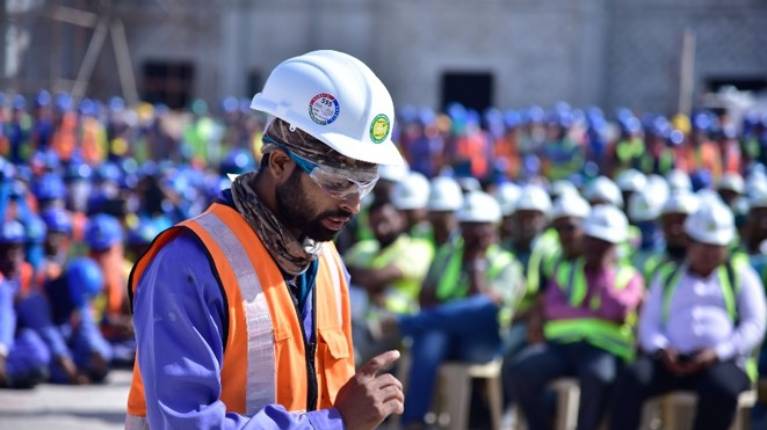The reforms demonstrate that change is achievable and should serve as an example for other nations in the area, the law firm stated.
Qatar’s major labour reforms have been spotlighted by a law firm providing four key “lessons” for employers with workforces in Gulf countries.
The Gulf country achieved a watershed moment in history after announcing major systematic reforms since it won the bid to host the World Cup back in 2010, working together with International Labour Organisation (ILO), which set up an office in Doha, to push for massive changes.
According to law firm Fisher Phillips, employers around the Gulf region should create workplace regulations that adhere to local employment law requirements as well as ILO standards.
“The groundbreaking labour reforms are positive step forward for Qatar, the Gulf and the Middle East more broadly,” the law firm argued.
“The reforms show that change is possible and will hopefully be a model for other countries in the region to follow.”
Dismantling Kafala system
Citing Qatar’s dismantling of the Kafala system, a legal system of migrant workers sponsorship, the law firm said employers should respect the flexibility and right of employees to change jobs.
Migrant workers are also no longer required to have their sponsor’s approval to leave the country.
The ILO’s assessment on the effects of the labour reforms provides evidence that these reforms allowed significant increases in worker mobility. Under the huge increase over the 2019 (18,000) and 2018 (9,000) figures, nearly 350,000 people changed occupations between 1 November, 2020 and 31 August, 2022.
“Other Gulf countries may follow Qatar’s lead in dismantling the Kafala system,” the law firm said.
As a result, it detailed, employers should be proactive in ensuring that the employment contracts and practices do not restrict employees’ freedom of movement, which includes meticulously drafting the terms of any “restrictive covenants”.
The former Kafala system made workers excessively dependent on their employers and led to situations of labour exploitation with the requirement for workers to take permission from their employers before changing occupations.
Sponsor retaliation in the form of threats of deportation and the cancellation of work licenses was a minor worry in light of the reforms. While there are clear cases of ongoing violations, Qatar has established a complaint system platform to safeguard employees from reprisal and regularly penalises sponsors who break the law.
Heat regulations
Under some of the key takeaways, Fisher Phillips pointed to the significance of updating the workplace safety and health regulations. All companies in the Gulf and, more widely, the Middle East, must comply with the Occupational Safety and Health Inspection (OSH) rules, including the ground-breaking limitations on hours of work during extreme heat conditions, it said.
The report cited the jeopardised safety of some staff working in scorching heat conditions in the Gulf countries, saying in 2020, Qatar adopted ILO’s OSH policies to protect workers’ health, curb accidents and injuries, and mitigate work related hazards.
As per Qatari legislation, employees are forbidden from outdoor work between the hours of 10 AM and 3:30 PM from 1 June 1 through 15 September – the hottest time of the year.
The overall number of hours that are prohibited to be designated work hours in Qatar is much more than in any other nation in the region, according to the ILO.
All outdoor labour must cease when temperatures reach 32.1 degrees Celsius on the Wet Bulb Globe Temperature (WBGT) index, which takes into account temperature, humidity, wind factor, and sun radiation.
The law firm said employers should continue to follow similar procedures to set safety requirements for employees in order to avoid potential accidents and fatalities at work.
Whistleblower, complaints programme
Employers should implement a transparent whistleblower program to promote honest reporting and make internal inquiry processes more obvious, the report suggested.
In 2021, an anonymous whistleblower channel was added to an internet platform for filing complaints. This caused the number of complaints to more than double, according to the ILO.
According to the study, 67% of the complaints that were received between October 2021 and October 2022 were settled prior to or during the conciliation stage, with the remaining complaints being forwarded to Labor Dispute Settlement Committees.
Non-discriminatory wage
Separately, Qatar became the first nation in the Gulf to implement a non-discriminatory minimum wage in March 2021. This rate is applicable to all workers, regardless of nationality, in all industries, including domestic work.
As a result, some 280,000 workers, or 13% of the workforce, had their pay increased to the new minimum threshold.
Employers are required to transfer workers’ wages via Qatari banks so that the Ministry of Labour can watch over the transactions and lessen wage fraud.
Infractions are reported to the police, and non-payment of wages carries a maximum fine of QAR 10,000 and a possible sentence of one year in jail.
However, while Qatar’s historic labour reforms have benefited hundreds of thousands of workers, more urgent effort is needed to hold employers accountable and ensure job mobility, workers and officials say.







